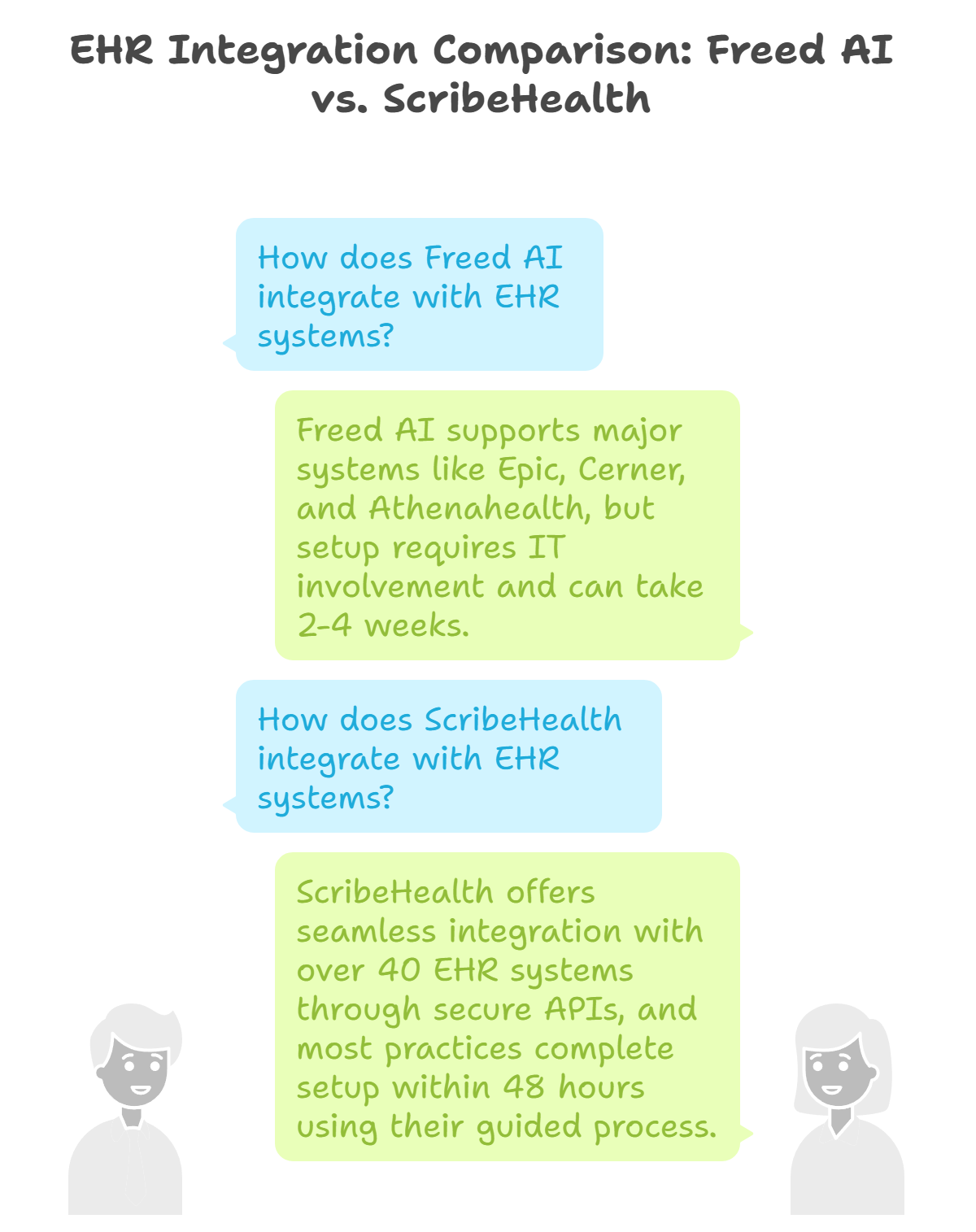Freed AI vs. ScribeHealth AI: Which AI Medical Scribe Delivers More Value in 2025?
Healthcare practices face a crucial choice between AI medical scribes in 2025. While Freed AI offers simple plug-and-play solutions at $99 monthly, ScribeHealth delivers superior value at $49 with advanced customization, higher accuracy rates, and better EHR integration. Growing practices consistently choose ScribeHealth for comprehensive documentation transformation and workflow optimization.

As a healthcare professional, you're drowning in documentation. You spend between 34-55% of your workday on clinical documentation and EMRs, stealing precious time from patient care. The good news? Thirty percent of outpatient notes are now generated by real-time AI medical scribes, and this technology is rapidly becoming essential for modern practices. With 43.2% of doctors still reporting burnout symptoms, choosing the right AI medical scribe platform isn't just about efficiency—it's about reclaiming your career satisfaction. This comprehensive comparison between Freed AI and ScribeHealth will help you make the decision that transforms your practice and restores your passion for medicine.
Comparing the Cost: Freed AI vs ScribeHealth
Cost remains the primary concern for healthcare practices evaluating AI scribes. Let's break down the true value proposition beyond just monthly pricing.
Freed AI Pricing Structure
Freed AI keeps pricing simple with a flat rate per provider. Their standard plan costs $99 per month for each clinician. This includes unlimited patient encounters and basic transcription features. However, you'll pay extra for premium features like advanced templates or priority support.
The company charges setup fees for larger practices. Groups with more than 10 providers face additional implementation costs. These hidden charges can add $500 to $1,500 to your first-year expenses.
ScribeHealth Investment Analysis
ScribeHealth offers flexible pricing starting at $49 per provider monthly. This base plan includes full customization features and unlimited documentation support. Unlike Freed AI, all advanced features come standard without extra charges.
The platform provides transparent pricing with no hidden setup fees.
Total Cost of Ownership (TCO) Comparison
Here's a detailed cost comparison for different practice sizes over 12 months:
The numbers show clear savings with ScribeHealth. AI medical scribes save clinicians an average of 2 hours per day, which translates to significant ROI regardless of platform choice. However, ScribeHealth's lower costs mean faster payback periods for practices of all sizes.
ScribeHealth and Freed AI—Feature Showdown
Beyond cost, feature differentiation determines which platform aligns with your practice's workflow needs. Here's how both platforms stack up on core functionality.
Documentation Speed
Real-time processing speed matters for busy practices. ScribeHealth generates preliminary notes during patient visits, allowing doctors to review and approve immediately. Freed AI requires 2-3 minutes of post-encounter processing time.
EHR Integration Capabilities
EHR integration determines how smoothly AI scribes fit into existing workflows. Freed AI supports major systems like Epic, Cerner, and Athenahealth. However, setup requires IT involvement and can take 2-4 weeks to complete.
ScribeHealth offers seamless integration with over 40 EHR systems. The platform connects through secure APIs without disrupting current workflows. Most practices complete setup within 48 hours using ScribeHealth's guided process.

Customization & Workflow Flexibility
Customization capabilities separate these platforms dramatically. Freed AI provides basic templates for common specialties like family medicine and internal medicine. Users can modify standard formats but can't create entirely new documentation structures.
ScribeHealth excels in customization, offering unlimited template creation and specialty-specific adaptations. The platform supports complex workflows like SOAP, DAP, and BIRP note formats seamlessly. Behavioral health practices particularly benefit from this flexibility.
Emphasizing Physician Wellness—How These AI Scribes Fight Burnout
Physician burnout continues to plague healthcare, but AI scribes offer tangible relief. Both platforms approach wellness differently—let's examine their impact on daily practice stress.
Time Savings & Work-Life Balance
The documentation burden consumes massive portions of physicians workdays. Physicians spend between 34-55% of their workday on clinical documentation and EMRs, leaving less time for actual patient care. Both AI medical scribes address this challenge but with different results.
Freed AI users report saving approximately 4 hours per week on documentation tasks. This reduction helps doctors leave the office earlier and reduces after-hours charting. However, the time savings plateau after initial implementation due to limited customization options.
ScribeHealth delivers more substantial wellness benefits through deeper workflow integration. The platform's advanced automation allows doctors to see 5 more patients per day on average without extending work hours. This increased capacity translates to higher revenue potential and better work-life balance.
ScribeHealth vs Freed AI: Direct Comparison
A side-by-side analysis clarifies each platform's strengths and ideal use cases. This comparison helps match the right solution to your practice's specific needs.
Feature Comparison Matrix
Ideal User Profiles
Freed AI works best for small primary care practices seeking simple solutions. Solo family medicine physicians and small internal medicine groups benefit from the straightforward approach. Practices with standard documentation needs and limited IT resources find Freed AI appealing.
ScribeHealth suits growing practices and complex healthcare environments. Multi-specialty groups, behavioral health centers, and large medical organizations leverage the platform's advanced capabilities. Practices prioritizing customization and detailed analytics choose ScribeHealth consistently.
The AI medical scribe comparison reveals clear distinctions in target markets. Freed AI serves practices wanting basic automation without complexity. ScribeHealth appeals to organizations seeking comprehensive documentation transformation and workflow optimization.
Why Growing Practices Prefer ScribeHealth Over Freed AI
Scalability challenges reveal platform limitations as practices expand. Growing healthcare organizations consistently choose ScribeHealth for specific strategic advantages.
Scalability & Multi-Provider Management
Practice growth tests AI scribe platforms differently. Freed AI handles individual providers well but struggles with enterprise-level management. Adding new users requires separate setup processes, creating administrative burden for practice managers.
ScribeHealth's centralized management system simplifies multi-provider administration. Practice administrators can add unlimited users, assign role-based permissions, and monitor usage across all locations from one dashboard. This scalability advantage becomes crucial as practices expand beyond 10-15 providers.
The AI in medical writing market is projected to reach $1.06 billion in 2025, indicating massive growth potential. ScribeHealth's architecture supports this expansion better than Freed AI's provider-centric model.
Analytics & Performance Insights
Data-driven practice management requires robust reporting capabilities. Freed AI provides basic usage statistics and time-saving estimates. These elementary metrics help individual physicians track personal productivity but offer limited practice-wide insights.
ScribeHealth's analytics dashboard delivers comprehensive performance intelligence. Practice managers access detailed reports on documentation efficiency, cost savings, and provider productivity. The platform tracks ROI metrics, helping justify continued investment and identify optimization opportunities.
Advanced reporting becomes essential for larger practices managing multiple locations and specialties. ScribeHealth's ability to segment analytics by provider, location, or specialty gives administrators granular control over performance monitoring.
Advanced Customization for Complex Workflows
Healthcare workflows vary dramatically between specialties and practice types. Freed AI's standardized approach works for routine encounters but fails during complex cases. Emergency departments, surgical practices, and specialty clinics need flexible documentation solutions.
ScribeHealth's clinical documentation capabilities adapt to any workflow complexity. The platform supports psychiatry and therapy practices with specialized templates and terminology recognition. This flexibility extends to all medical specialties through unlimited customization options.
FAQs About AI Medical Scribes
Common questions about AI medical scribes help address implementation concerns and decision-making factors.
Implementation & Training
Q: What training do staff members need?
Freed AI requires minimal training due to its simplified interface. ScribeHealth provides comprehensive onboarding but offers more powerful features afterward. Both platforms include ongoing support and training resources.
Q: How do practices manage the transition period?
Successful implementations include parallel documentation for 1-2 weeks. This overlap ensures accuracy while staff adapt to new workflows. Both platforms offer transition support and temporary assistance during changeover periods.
Security & Compliance
Q: Are AI medical scribes HIPAA compliant?
Both platforms maintain strict HIPAA compliance standards with encrypted data transmission and secure cloud storage. Freed AI details their privacy measures comprehensively on their website.
Technical Support & Reliability
Q: How accurate are AI-generated notes?
Accuracy depends on audio quality, medical complexity, and provider speaking patterns. ScribeHealth consistently achieves higher accuracy rates through advanced AI training and continuous learning capabilities.
Conclusion: Flexibility & Value or Plug-and-Play Simplicity?
The choice between ScribeHealth and Freed AI depends on your practice's priorities and growth trajectory. Freed AI suits small practices wanting immediate documentation relief without complexity. The platform's $99 monthly cost and simple setup appeal to solo providers and small groups.
ScribeHealth delivers superior value for practices prioritizing customization, accuracy, and long-term scalability. At $49 per provider monthly, the platform costs less while offering more advanced features. The comprehensive analytics, unlimited customization, and superior EHR integration justify the investment for growing practices.
Ready to transform your practice's documentation workflow? Book a demo with ScribeHealth today and discover how our AI medical scribe can reduce your documentation burden by 70% while improving accuracy and patient care quality.

